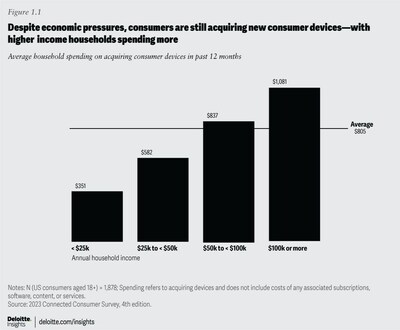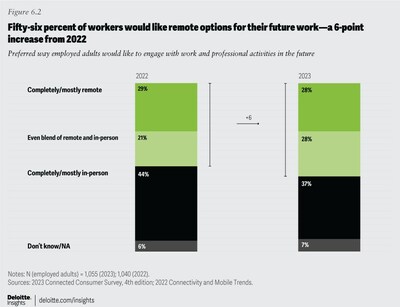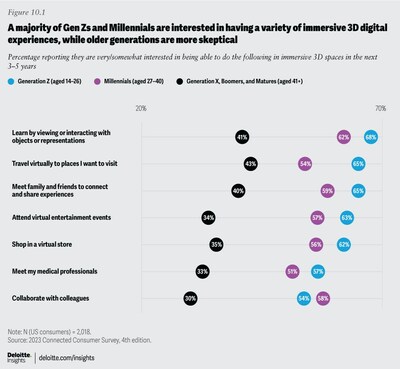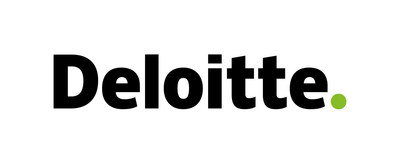Fourth annual Deloitte “Connected Consumer” survey reveals consumers want to balance digital and physical lives as they streamline devices, spend selectively on technology, demand innovation, safety and utility in a connected world
NEW YORK, Sept. 7, 2023 /PRNewswire/ —
Key takeaways
- Nearly half of households (48%) bought at least one new connected device in 2023, with 16% adding three or more.
- As households add new tech devices, they are trimming devices that no longer fit their needs. Households have an average of 21 connected devices in 2023, down from 25 in 2021 when many loaded up on technology during the COVID-19 pandemic.
- Consumers want to trim tech complexity: 41% dislike managing their devices, while 28% say managing tech devices and subscriptions is “overwhelming.”
- Employee preference for hybrid work increased by 7 percentage points in 2023. The main benefits of hybrid work cited by respondents include better relationships with family and co-workers, and improved health and well-being.
- Satisfaction with virtual health visits is growing. Most people who experienced a virtual health visit would prefer virtual or hybrid options in the future for psychological health and chronic conditions.
- Parents see positives in connected devices for their children, reporting they enhance learning, enable new experiences, and keep kids organized — but they also worry about potential harms and set boundaries on their children’s digital behaviors.
- Security concerns have grown: 58% of surveyed consumers worry their devices are vulnerable to security breaches (up from 50% in 2022), and 58% worry that organizations or people could track them through their devices (up from 41% in 2022).
Why this matters
Deloitte unveiled the results of its “2023 Connected Consumer Survey,” fourth edition to provide insight into consumer sentiment about digital devices and technology and explore how consumers are optimizing usage, while striking a balance between digital and physical worlds. The study of over 2,000 U.S. consumers highlights ways that people integrate digital technologies into their lives. It captures the pulse of a populace increasingly reliant on technology for remote work, virtual education, virtual health care, fitness, communication and entertainment. Despite the complexities and potential drawbacks, consumers surveyed convey a strong sense of resilience and adaptability, even as they call for more support from tech companies to innovate and secure their digital experiences.
Key quote
“Deloitte’s Connected Consumer survey paints a vivid picture of a society that is learning to use technology wisely. Consumers are no longer amassing devices; they’re carefully selecting them with purpose to foster digital harmony. From embracing a more conscious approach to device consumption to adapting to the changing landscape of virtual health care and hybrid work, the findings underscore the ingenuity and resilience of the modern consumer. The journey ahead is filled with opportunities for companies to innovate and respond to these evolving needs.”
— Paul Silverglate, vice chair, Deloitte LLP and U.S. technology sector leader
Streamlining devices and digital behaviors
While the average number of digital devices in the household dropped by four in the past two years, from 25 in 2021, to 21 in 2023, that doesn’t mean consumers have less interest in devices. Instead, it indicates they are streamlining and getting rid of obsolete or less-useful devices while still purchasing new ones. There is an opportunity for tech companies to better support customers wanting to strike a balance that maximizes benefits and minimizes the drawbacks of living a connected life.
- Forty-eight percent (48%) of surveyed consumers purchased new connected devices for their household in the past year.
- Among respondents, 63% expect their spending on acquiring devices to stay the same over the next 12 months, and only 7% expect to decrease spending. Nine percent (9%) plan to increase their spending.
- Forty-nine percent (49%) of consumers delayed device purchases during the past year due to economic conditions, while 33% feel they can’t afford to buy the tech devices their household needs (up from 25% in 2022).
- Consumers continue to grapple with managing their digital lives: 41% dislike managing their devices, and 28% feel overwhelmed by the number of devices and subscriptions they need to manage (up from 24% in 2022).
A focus on digital well-being with increased security of devices and home
The study found an increase in consumer actions taken to protect data privacy and security, reflecting consumers’ heightened awareness and proactive stance towards digital safety. Smart home devices are indispensable to many and have become part of their daily lives — often being used to help increase home security.
- Among consumers surveyed, 34% were victim to at least one kind of security breach in the past year, and 16% experienced two or more.
- Gen Zs were more than twice as likely as boomers to have their social media account hacked (17% vs. 8%) and three times more likely than boomers to fall for an online scam (16% vs. 5%).
- Seventy-nine percent (79%) of consumers say they have taken at least one step to address their data privacy and security concerns (up from 71% in 2022).
- Smart home devices that most owners consider essential all relate to home safety, including smart door locks, smart smoke detectors, security systems, and doorbells with cameras.
Embracing virtual health care, fitness devices and remote learning
The study found increased satisfaction with virtual health care services, signaling growing acceptance and understanding of digital access to health care. Like health care, a significant portion of respondents expressed interest in continuing a blend of remote and in-person learning, showcasing an appreciation for the flexibility that virtual classrooms offer. The past year has also seen significant changes in consumer attitudes and behaviors towards fitness devices.
- Forty-two percent (42%) of respondents had at least one virtual medical appointment in the past year, and 9 in 10 were very/somewhat satisfied with their virtual medical appointments.
- For education, remote learning is gaining fans: 52% of those who learned remotely over the past year would like to learn completely/mostly remotely in the future, up from 41% in 2022.
- Sixty-four percent (64%) of both smartwatch/fitness tracker and smartphone owners report these devices improve their health. Sixty-nine percent (69%) of smartwatch/fitness tracker users say the device improves their fitness, and 58% of smartphone owners feel the same about their phones.
Thriving in a hybrid workforce
The study affirms that respondents would like hybrid work to stay. Many people prefer a blend of remote and in-office work and report high levels of satisfaction with this arrangement. As employees adapt to hybrid work, the need for businesses to refresh and improve tech solutions becomes more apparent.
- Fifty-six percent (56%) of employed adults worked in a fully remote or hybrid way at their primary job over the past year (22% said they worked fully at home, and 34% split their time between in-office and at-home), and nearly half said they helped drive the decision.
- Many remote and hybrid workers feel that working from home has improved their relationships and emotional well-being. Among respondents, 45% said working from home caused family relationships to improve and 40% said it improved their emotional well-being.
Key quote
“Digital transformation is reshaping how we live and work in fundamental ways. Technology is more vital than ever, serving as a frontier for advantage, innovation, and competitive differentiation. From leveraging 5G, to exploring the hurdles of hybrid work and assessing the potential of generative AI, our study reveals how businesses and consumers alike are pushing boundaries. Our role is to advise our clients on how to stay ahead of this curve, aligning technology with human needs, and crafting solutions that drive a seamless, productive, and more connected life.”
— Jana Arbanas, vice chair, Deloitte LLP, and U.S. telecom, media and entertainment sector leader
Consumers want innovation in 5G
Another finding from the study was consumers’ continued call for innovative apps and experiences that take full advantage of 5G technology capabilities. More than half of the respondents with 5G smartphones (53%) said they’re looking for these apps, and more than a quarter (26%) expressed disappointment in the lack of such innovative apps and services.
- Overall, 62% of consumers with smartphones say they have 5G, up from 50% in 2022.
- 5G smartphone users say they do more of some things, compared to before they had 5G, with 1 in 5 using their phone more to pay for items in a store and to act as a hotspot. Nearly 1 in 4 watch streaming videos more (4 in 10 Gen Zs do more of this than before they had 5G), and nearly 1 in 5 play more videogames (1 in 3 Gen Zs do more of this than before they had 5G).
- 5G fixed wireless is an emerging trend for home internet: 12% of home internet consumers say they have fixed wireless (compared to 8% in 2022), and a majority of them say it’s 5G.
Future perspectives: immersive 3D experiences (metaverse) and generative AI
The study points to the promising growth of immersive 3D experiences and growing interest and awareness in generative AI among consumers, especially in the younger generations.
- More than 6 in 10 Gen Zs and more than half of millennials are interested in learning by viewing or interacting with 3D objects or representations; traveling to places of interest virtually; meeting with friends and family in 3D spaces; attending 3D virtual entertainment events; and shopping in 3D stores.
- Almost 1 in 5 respondents surveyed (17%) said they have experimented with generative Al or used it for projects/tasks: Of these, 72% used it for personal purposes, 21% for school/education, and 20% for their job/professional purposes. Seventy-two percent plan to keep using it.
About this survey
To understand consumer attitudes toward “digital life,” the Deloitte Center for Technology, Media & Telecommunications conducted a survey of 2,018 US consumers in Q2 2023. Aspects of digital life that the survey covered include devices (technology, entertainment, smart home, smartphones), connectivity (home internet and mobile), virtual experiences (work, school, and health care), wearables (fitness trackers and smart watches), and challenges of managing it all. All data was weighted to the most recent US Census to arrive at a representative view of US consumers’ opinions and behaviors. To gain a more detailed understanding of various consumer groups, we also segmented respondents into generational groups defined by their birth year: Generation Z (1997–2009), Millennials (1983–1996), Generation X (1966–1982), Boomers (1947–1965), and “Matures” (1946 and prior).
About Deloitte
Deloitte provides industry-leading audit, consulting, tax and advisory services to many of the world’s most admired brands, including nearly 90% of the Fortune 500® and more than 8,500 U.S.-based private companies. At Deloitte, we strive to live our purpose of making an impact that matters by creating trust and confidence in a more equitable society. We leverage our unique blend of business acumen, command of technology, and strategic technology alliances to advise our clients across industries as they build their future. Deloitte is proud to be part of the largest global professional services network serving our clients in the markets that are most important to them. Bringing more than 175 years of service, our network of member firms spans more than 150 countries and territories. Learn how Deloitte’s approximately 415,000 people worldwide connect for impact at www.deloitte.com.
Deloitte refers to one or more of Deloitte Touche Tohmatsu Limited, a UK private company limited by guarantee (“DTTL”), its network of member firms, and their related entities. DTTL and each of its member firms are legally separate and independent entities. DTTL (also referred to as “Deloitte Global”) does not provide services to clients. In the United States, Deloitte refers to one or more of the US member firms of DTTL, their related entities that operate using the “Deloitte” name in the United States and their respective affiliates. Certain services may not be available to attest clients under the rules and regulations of public accounting. Please see www.deloitte.com/about to learn more about our global network of member firms.
![]() View original content to download multimedia:https://www.prnewswire.com/news-releases/deloitte-the-connected-consumer-paradox—desire-for-fewer-devices-vs-more-virtual-experiences-and-technology-innovation-301919928.html
View original content to download multimedia:https://www.prnewswire.com/news-releases/deloitte-the-connected-consumer-paradox—desire-for-fewer-devices-vs-more-virtual-experiences-and-technology-innovation-301919928.html
SOURCE Deloitte

Featured image: ©







